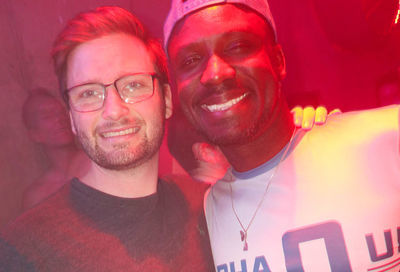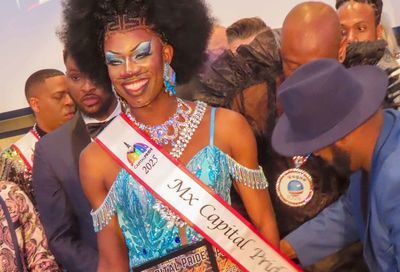A Conversation with Cronkite
Uncovered 1996 interview illustrates some of the late, illustrious newsman's views on GLBT equality
For decades, Walter Cronkite covered the highs and lows of the American experience, primarily for CBS. He had an unsurpassed role in shaping the evolution of journalism in America. On July 17, he died, leaving behind that legacy at the age of 92.
More than a decade earlier, March 6, 1996, he had a lunch with Mark Segal. It was not their first encounter. The two had actually met in 1973 when Segal hijacked a live broadcast of the CBS Evening News, holding a sign in front of Cronkite reading “Gays Protest CBS Prejudice.”
“After that incident, CBS News agreed to look into the ‘possibility’ that they were censoring or had a bias in reporting news regarding the struggle for gay rights,” Segal wrote shortly after Cronkite’s death. “Walter and I would disagree about that to this day, both with smiles on our faces. But the fact remains, a week after the incident, Walter showed a map on the CBS Evening News of the U.S. and pointed out cities that had passed gay-rights legislation. Network news was never the same after that.”
What follows is an excerpt from that 1996 lunchtime conversation between Segal, now publisher of the Philadelphia Gay News, and Cronkite, which Segal recorded. Segal rediscovered the unpublished interview upon Cronkite’s death, from the drawer where it sat for 13 years.
MARK SEGAL: What are your thoughts on gay marriage?
WALTER CRONKITE: I don’t see why states should have any interest in gay marriage. That’s not an issue that the state government — or any government — should be involved in. This is a personal question and should be solved on a personal basis, and I just don’t believe the government has any role in it.
If there is an attempt to legislate against it, like the attempt to legislate against abortion, this is an interference of personal and civil rights that should be protested and contested. Short of that, the attitude ought to be, “Well, that’s the way they feel. This doesn’t have to be the way I feel, but let’s … live together and accept these things.”
I think that I’m getting on very dangerous ground here, but I think there is a danger in trying to force an acceptance of your lifestyle. This ought to come through the more gradual, educational process. But I don’t want to sound like [Republican presidential candidate] Steve Forbes and abortion.

Walter Cronkite
It really isn’t your business to sell this to the public. Educate the public. But don’t try to sell it. … Sometimes the line is crossed there — that you’re trying to propagandize the people to accept what you believe to be right. There is a fine line between defense and aggression, and that line has to be very clearly defined and closely observed.
SEGAL: Acceptance has been a long time coming, and we still have areas like the military where public support has risen but those in the leadership have not bought into the notion.
CRONKITE: In the military, I believe fully that, there again, it’s a question of one’s civil rights and one certainly should have the right to live as one chooses.
The suggestion that homosexuality is somehow going to be forced upon the other members of the barracks seems to me to be a non-issue. It’s just a ridiculous red herring.
I know that some of my friends in the military think it’s a ridiculous issue to make, an issue of what could be.
SEGAL: The right wing has used us as an election ploy for years, but there have been and still are legitimate conservative extremists who wish violence upon the gay community. How should we deal with people like that?
CRONKITE: I think we all should be fearful of any issue regarding extremists, whether they’re left or right. Certainly, I’d be very concerned, particularly if I were one of the minority group, about this attempt to enforce a moral code through some misinterpretation of some religious beliefs. I’d be very worried about that. Yeah, I’d be concerned. I’m concerned about that kind of attitude from both left and right in the country. Militants who are fanatic in their beliefs are dangerous wherever they lie.
I don’t like the word ”attack.” I wouldn’t ”attack” anybody. That’s certainly not necessary, and probably counterproductive. But defense mechanisms against the know-nothings in our world certainly are required. There you have a duty to answer those arguments that are, to your mind, completely out of line. I think that that’s fundamental: a fundamental right and a fundamental duty, a fundamental responsibility to what you believe in.
SEGAL: What about demonstrations?
CRONKITE: There’s no question that militant demonstrations offend a proportion of the population, no matter what the subject matter is. There are people that would rather not be awakened to issues, rather not be bothered by issues, they do not like seeing the city streets used as theater for issues, and they are the people who do not understand the Constitution and the right to demonstrate. Those are the very ones who, if you ask them if people have a right to demonstrate, if [you said], ”Do you believe in the Constitution? It says people have the right to express their opinion,” they’d all say, ”Oh, yes, absolutely.”
”Well, do they have the right to demonstrate in front of the White House?”
”Oh, no! They shouldn’t be doing that!”
People have a kind of, I guess, a cleavage between theory and what they really want to see happening on the streets. So there’s always going to be that resentment towards demonstrators, no matter if it’s gay-rights demonstrators or … other issues. I don’t think that you could make a judgment on the success of such a thing. You have to make a judgment on the basis of the entire approach, the public perceptions from the situation, as opposed to before such activity began. I don’t think there’s any question that there’s a very positive, educational effect.
Whatever can be done to educate the public to the nature of homosexuality, … to the rights, civil rights to those who have a different lifestyle than the majority, this sort of thing, this is what is required.
SEGAL: What do you think of the gay movement now, compared to its beginnings?
CRONKITE: It seems to me that the gay movement has been highly successful. I think there’s much more awareness. … It seems to me that the approval rating among the polls is good. And if that’s the result, then the movement has been successful.
Support Metro Weekly’s Journalism
These are challenging times for news organizations. And yet it’s crucial we stay active and provide vital resources and information to both our local readers and the world. So won’t you please take a moment and consider supporting Metro Weekly with a membership? For as little as $5 a month, you can help ensure Metro Weekly magazine and MetroWeekly.com remain free, viable resources as we provide the best, most diverse, culturally-resonant LGBTQ coverage in both the D.C. region and around the world. Memberships come with exclusive perks and discounts, your own personal digital delivery of each week’s magazine (and an archive), access to our Member's Lounge when it launches this fall, and exclusive members-only items like Metro Weekly Membership Mugs and Tote Bags! Check out all our membership levels here and please join us today!























